#AI agents for process automation
Explore tagged Tumblr posts
Text
Stay ahead with the latest trends in AI agents. Learn how these autonomous tools are reshaping industries, from finance to healthcare.

Discover how AI agents are transforming industries with intelligent automation, boosting efficiency, and enabling smarter decision-making in 2025 and beyond.
#AI agents#autonomous AI agents#intelligent agents#AI automation#AI-powered tools#artificial intelligence agents#AI agents in business#AI customer service agents#AI agents for startups#AI automation for enterprises#AI virtual assistants#workflow automation#generative AI#AI trends 2025#future of AI#machine learning agents#conversational AI#AI task automation#how AI agents work#benefits of AI agents#best AI agents for productivity#using AI agents in business#AI agents for process automation#top AI agents tools
1 note
·
View note
Text
AI Agent Process Automation for Engineering in the USA: Unlocking Smart Manufacturing for SMBs
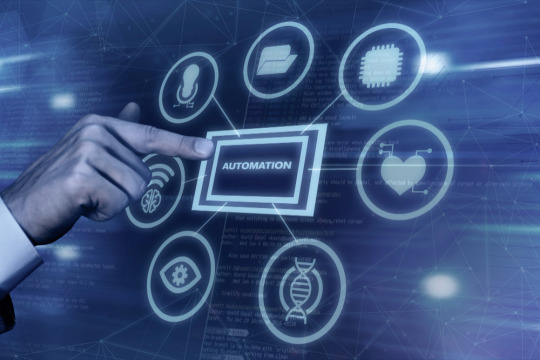
Deloitte has unveiled a suite of over 100 ready-to-deploy AI agents in partnership with Google Cloud and ServiceNow, marking a major leap toward enterprise-wide intelligent automation. Their collaboration also introduces Agent2Agent (A2A), a new interoperability protocol that allows AI agents to communicate across platforms—unlocking the full potential of multi-agent ecosystems.
While this breakthrough is making headlines in the enterprise world, it signals something even more exciting for small and mid-sized manufacturers in the U.S.: the era of scalable, intelligent automation is here—and it’s more accessible than ever. Through AI agent process automation for engineering and manufacturing, SMBs can now streamline operations, reduce costs, and compete with agility once reserved for industry giants.
What Is AI Agent Process Automation for Engineering?
An AI agent is a self-directed software system that can analyze data, make decisions, and take action without constant human oversight. When applied to engineering and manufacturing, these agents can:
● Predict equipment failures before they occur
● Optimize production schedules in real time
● Automate quality inspections using computer vision
● Manage inventory and procurement dynamically
● Streamline design and testing workflows
Unlike traditional automation, AI agent process automation for engineering is adaptive and intelligent. It doesn’t just follow rules—it learns, evolves, and collaborates with human teams to drive continuous improvement.
Why SMB Manufacturers Are Turning to AI Agents
The shift toward intelligent automation is accelerating across the U.S. According to a 2025 industry report, over 65% of manufacturers plan to deploy AI-driven systems within the next 12 months. For SMBs, the benefits are especially compelling:
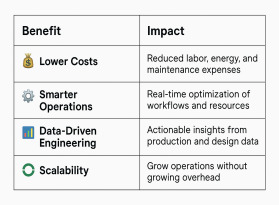
And thanks to robotic process automation as a service (RPAaaS), these capabilities are now accessible without massive capital investment. SMBs can subscribe to cloud-based AI tools that automate everything from compliance reporting to CAD file management—no in-house AI team required.
Explore AI Agent Solutions with Performix
If you're a small or mid-sized manufacturer looking to modernize your engineering and production workflows, now is the time to explore AI agent process automation for engineering. The tools are ready, the ROI is real, and the competitive edge is within reach.
Learn more about Performix’s Artificial Intelligence Solutions
The future of U.S. manufacturing won’t be defined by size—it will be defined by intelligence. Whether you're optimizing a single process or reimagining your entire operation, AI agent process automation for manufacturing offers a smarter, more scalable path forward.
Set up a FREE Discovery Call
#ai agent process automation for engineering#ai agent#ai agent process automation for manufacturing#robotic process automation as a service#ai agent process automation for engineering in USA
0 notes
Text
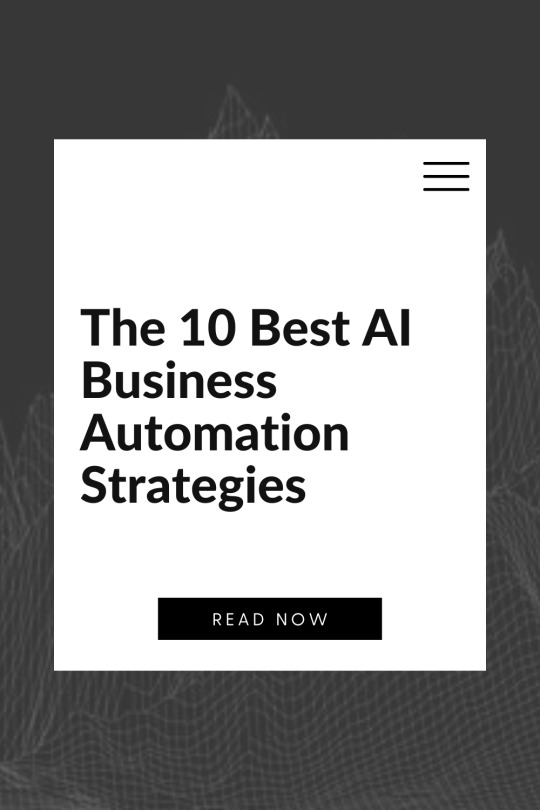
The 10 Best AI Business Automation Strategies
In today’s world of businesses, companies are under constant pressure to do more with less. Whether it’s streamlining operations, improving decision-making, or delivering greater value to customers, companies must constantly adapt. And increasingly, they’re turning to artificial intelligence to make it happen.
AI-driven business solutions are becoming more accessible, more powerful, and more deeply integrated into core business functions. From automating repetitive tasks to deploying intelligent agents that can make decisions on their own, AI is helping teams boost productivity and focus on what matters most. Whether you are leading a lean startup or running a global enterprise, understanding how to apply AI in meaningful ways is quickly becoming a must-have skill.
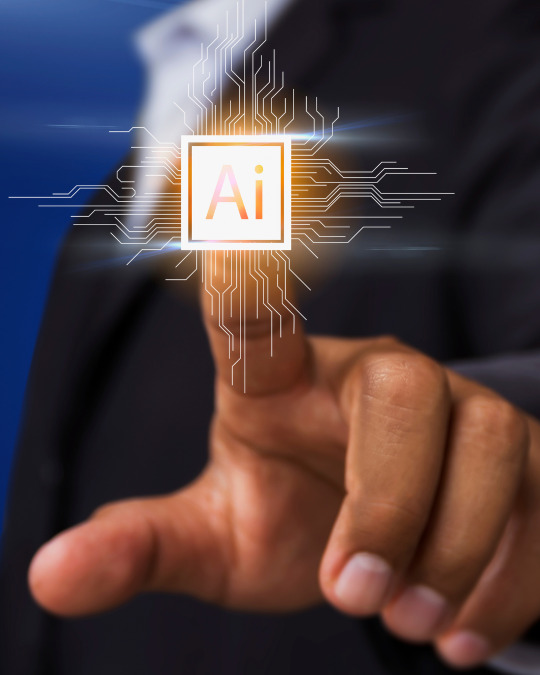
The 10 AI Strategies That Work
1. Intelligent Process Automation (IPA)
Intelligent Process Automation (IPA) Intelligent process automation combines robotic process automation (RPA) with AI technologies such as machine learning, natural language processing, and computer vision. Unlike traditional RPA which handles repetitive, rule-based tasks, IPA adapts to changes in data and learns over time.
Businesses can apply IPA to tasks like invoice processing, customer onboarding, and document classification. For example, a major insurance company used IPA to automate claims processing, reducing average handling time from 15 days to under 48 hours. By doing so, they reduced operational costs, minimized errors, and increased customer satisfaction. When paired with predictive analytics, IPA becomes even more powerful, enabling organizations to foresee potential issues and resolve them proactively.
2. AI-Enhanced Customer Service
AI-Enhanced Customer Service Customer expectations are at an all-time high, and businesses are under pressure to deliver fast, accurate, and personalized support. AI-driven business solutions, particularly chatbots and virtual assistants, are revolutionizing customer service by offering 24/7 support that improves with every interaction.
Take the case of a telecom company that deployed AI chatbots to handle basic inquiries. Within six months, their customer service wait times dropped by 60%. Agentic AI takes this to the next level by not just responding to queries but proactively anticipating customer needs. It can guide customers through complex processes, recommend solutions, and escalate issues intelligently. This frees up human agents to focus on higher-level tasks and fosters deeper customer relationships.
3. Predictive Sales and Marketing Automation
Predictive Sales and Marketing Automation Sales and marketing teams can leverage AI to uncover hidden patterns in customer behaviour and deliver the right message at the right time. AI models can analyze vast amounts of data to identify which leads are most likely to convert, when to reach out, and what content will resonate most.
A mid-sized e-commerce company integrated predictive analytics into their marketing platform and saw a 20% increase in conversion rates within the first quarter. Tools powered by AI can automate A/B testing, segment audiences more precisely, and personalize outreach across channels. This not only boosts conversion rates but also optimizes marketing spend by focusing efforts where they will yield the highest return.
4. Autonomous Financial Forecasting
Autonomous Financial Forecasting AI-driven financial planning and analysis tools are changing the game for CFOs and finance teams. These systems use historical and real-time data to generate forecasts, detect anomalies, and provide recommendations on budgeting and resource allocation.
For instance, a multinational manufacturing firm used AI to forecast demand fluctuations and adapt procurement strategies accordingly, saving over $10 million annually. Agentic AI systems can go even further by autonomously simulating different financial scenarios and adjusting models based on new inputs. This dynamic approach to financial planning reduces risk and allows organizations to respond quickly to changing economic conditions.
5. Talent Acquisition and Human Capital Optimization
Talent Acquisition and Human Capital Optimization Recruiting, onboarding, and managing talent is a critical function that benefits immensely from AI automation. AI can sift through resumes, rank candidates based on job fit, and even conduct preliminary interviews using sentiment analysis.
A tech startup adopted AI-powered recruitment software and cut their time-to-hire in half while improving the quality of hires. Once employees are onboarded, AI can monitor performance metrics, identify training needs, and predict attrition. This enables HR teams to take proactive steps to retain top talent and build a more engaged workforce. AI-driven platforms also ensure that workforce planning is data-informed and aligned with business goals.
6. Supply Chain Optimization
Supply Chain Optimization In an increasingly globalized economy, supply chain resilience is essential. AI tools can predict demand, optimize inventory, and identify potential disruptions before they occur. From logistics to procurement, AI ensures smoother operations by providing real-time insights and automation.
During the pandemic, a major retailer used AI to reconfigure their supply chain in real time, avoiding massive inventory losses. Agentic AI can autonomously reroute shipments, negotiate with suppliers, or trigger contingency plans based on environmental or market changes. This makes the supply chain more adaptive and responsive to unforeseen challenges.
7. Document and Data Management
Document and Data Management Businesses deal with an enormous amount of unstructured data: emails, contracts, reports, and more. AI-powered document management systems can automatically categorize, summarize, and extract relevant information from these sources.
A law firm integrated AI into their document system and reduced legal research time by 70%. This drastically reduces the time employees spend searching for documents or inputting data manually. It also enhances compliance and audit readiness by ensuring records are stored and retrieved systematically. In legal and financial sectors, such AI tools are becoming indispensable.
“AI is the defining technology of our time. Every business process will be reimagined with AI.”
— Satya Nadella (CEO of Microsoft)
8. Personalized Product and Service Delivery
Personalized Product and Service Delivery Personalization has become an expectation. AI algorithms can analyze customer preferences, browsing behaviour, and purchase history to tailor recommendations and experiences.
Netflix’s recommendation engine is a classic example, responsible for over 80% of the content users watch. In healthcare, AI can deliver patient-specific treatment suggestions based on medical history and genetic data. The future of AI-driven business solutions lies in hyper-personalization that adapts to individual needs across all touchpoints.
9. Risk Management and Compliance Automation
Risk Management and Compliance Automation Regulatory compliance is complex and time-consuming. AI can automate the monitoring of transactions, communications, and workflows to ensure they align with regulatory standards.
A global bank used AI to monitor trading activities and flag suspicious behaviour, improving compliance efficiency by 40%. Agentic AI adds a layer of intelligent decision-making by adapting to new regulations as they are introduced. It flags potential risks, recommends remediation actions, and provides explanations for audit trails. This is particularly vital in sectors like finance, healthcare, and energy where compliance is heavily scrutinized.
10. Agentic AI for Autonomous Business Decision-Making
Agentic AI for Autonomous Business Decision-Making Perhaps the most forward-looking strategy is the deployment of agentic AI systems that can act independently within defined parameters. These systems learn from experience, set their own goals, and carry out complex tasks without constant human intervention.
For example, a SaaS company implemented agentic AI to autonomously manage and optimize user onboarding flows. It led to a 25% increase in user activation and retention with minimal human oversight. Agentic AI might manage a product launch, adjust a marketing strategy based on competitor moves, or optimize internal processes across departments. The potential for autonomy means businesses can operate more efficiently, reduce human error, and scale operations like never before.
How to Start: Implementing AI Automation in Your Business
If you’re ready to start integrating AI automation into your business but unsure where to begin, follow these practical steps:
1. Identify a High-Impact Use Case
Start small, but think smart. Look for a single process in your business that is repetitive, time-consuming, or prone to human error. This could be anything from manual data entry and inventory tracking to responding to customer inquiries. Choosing a task with clear pain points makes it easier to measure results and build a compelling case for broader adoption.
Pro tip: Ask your teams where the bottlenecks are. The best automation opportunities often hide in plain sight.
2. Evaluate AI Tools That Fit Your Needs
Once you know what to automate, the next step is choosing the right technology. Today’s AI landscape is rich with platforms that offer automation capabilities from workflow bots to natural language processing and predictive analytics. Focus on tools that are accessible (think low-code or no-code) and designed for your industry or business size.
Look for: Scalability, ease of integration with existing systems, security features, and vendor support.
3. Launch a Pilot Project and Measure Everything
Before a full rollout, test your solution on a smaller scale. A pilot allows you to validate the AI’s performance and fine-tune the implementation. Define clear metrics from the start, such as time saved, error rates reduced, or improvements in response time to gauge the success of the pilot.
Don’t skip this step. It helps prevent costly missteps and builds internal confidence in the technology.
4. Iterate, Optimize, and Scale
Use the insights from your pilot to improve the system: tweak the AI model, adjust workflows, and gather feedback from users. Once the process is refined and delivering measurable results, begin expanding it to other departments or tasks. Automation success grows best when it's built gradually and thoughtfully.
Start a playbook. Document what worked and what didn’t so you can replicate success elsewhere.
5. Train Your Team and Build a Culture Around AI
Technology is only half the equation, people are the other half. Ensure your employees understand how to use the new tools and why automation is being introduced. Host workshops, provide hands-on training, and clarify how AI will support (not replace) their roles.
Empowered teams adopt faster. Make training a continuous process, not a one-time event.
The future of AI isn’t something to wait for, it’s already here, quietly transforming how business is done every minute. The only question is: will you be ahead of the curve or racing to catch up?
With these 10 strategies, you’ve got a blueprint to lead with confidence, intelligence, and speed.
Learn more about DataPeak:
#factr#datapeak#technology#artificial intelligence#ai#machine learning#agentic ai#ai-driven business solutions#machine learning for workflow#saas#automation#artificialintelligence#ai solutions for data driven decision making#ai business tools#aiinnovation#no code platforms#digital trends#digitaltools#digital technology#datadrivendecisions#dataanalytics#data driven decision making#ai driven business solutions#ai for business efficiency#ai business solutions#ai platform for business process automation
0 notes
Text
Harnessing Agentic AI: Transforming Business Operations in 2025
Introduction
Artificial Intelligence (AI) has evolved significantly, and in 2025, we are witnessing the rise of Agentic AI in Business—an advanced form of AI capable of autonomous decision-making, problem-solving, and self-learning without constant human intervention. This new wave of AI is set to revolutionize business operations across industries, enhancing efficiency, productivity, and innovation.
In this blog, we explore how businesses can harness Agentic AI to gain a competitive edge, streamline workflows, and enhance customer experiences.
Understanding Agentic AI
What is Agentic AI?
Agentic AI refers to artificial intelligence systems that operate with a high degree of autonomy, making strategic decisions, adapting to dynamic environments, and executing tasks without explicit instructions. Unlike traditional AI models that rely on predefined rules, Agentic AI learns, evolves, and self-corrects based on real-time data and experiences.
Key Features of Agentic AI
Autonomous Decision-Making: Can analyze complex situations and make data-driven choices.
Self-Learning Capabilities: Continuously improves performance without human intervention.
Context Awareness: Understands situations and adjusts actions accordingly.
Interoperability: Can integrate seamlessly with various business systems.
For businesses looking to implement Agentic AI solutions, TechGeekz Services offers customized AI-driven automation solutions tailored to diverse industry needs.
How Agentic AI is Transforming Business Operations
1. Enhancing Business Efficiency
Agentic AI optimizes business processes by automating repetitive and time-consuming tasks, allowing employees to focus on strategic initiatives.
How It Works:
Automates document processing and data entry.
Improves supply chain logistics by predicting inventory needs.
Enhances workflow management with intelligent scheduling.
➡ Explore TechGeekz’s AI-powered business automation tools to improve efficiency in your organization.
2. Revolutionizing Customer Experience
With Agentic AI, businesses can offer hyper-personalized customer experiences that increase engagement and satisfaction.
Key Benefits:
AI Chatbots: Provide real-time support with human-like responses.
Predictive Analytics: Forecast customer preferences and behaviors.
Sentiment Analysis: Understand customer feedback to refine services.
3. AI-Powered Cybersecurity
As cyber threats become more sophisticated, Agentic AI plays a crucial role in security operations by detecting vulnerabilities and preventing attacks in real time.
AI Security Features:
Detects and mitigates fraud automatically.
Monitors systems for suspicious activities.
Strengthens authentication with biometric and behavioral analysis.
💡 Protect your business with TechGeekz’s AI cybersecurity solutions.
4. Streamlining Human Resource Management
Agentic AI is transforming HR processes by making recruitment, employee engagement, and performance evaluations more efficient.
How Businesses Benefit:
AI-powered applicant screening saves time in hiring.
Employee performance tracking ensures better workforce management.
AI-driven learning platforms personalize training programs.
🔍 Explore TechGeekz’s HR automation solutions to revolutionize talent management.
5. Optimizing Marketing and Sales
AI is enabling businesses to make data-driven marketing decisions, leading to increased conversions and customer loyalty.
Agentic AI in Marketing:
Automates personalized email campaigns.
Predicts purchasing behavior with AI analytics.
Enhances ad targeting through real-time data analysis.
📊 Leverage TechGeekz’s AI marketing solutions for a data-driven sales strategy.
The Future of Agentic AI in Business
As we move further into 2025, businesses that embrace Agentic AI will enjoy enhanced agility, cost savings, and improved decision-making. The future will see AI evolving into more sophisticated models with increased ethical and regulatory considerations.
🔗 For businesses ready to integrate AI-driven transformation, TechGeekz Services provides end-to-end AI implementation solutions.
Conclusion
Agentic AI is reshaping the business landscape, offering organizations unprecedented opportunities to enhance efficiency, security, and customer experiences. By adopting AI-driven solutions, businesses can stay ahead of the competition and drive long-term success.

Forbes: How AI is Transforming Business
MIT Technology Review: AI’s Role in the Future of Business
TechGeekz’s AI Automation Solutions
TechGeekz’s AI-Powered Cybersecurity
TechGeekz’s AI Marketing Solutions
#Agentic AI#AI agents#Autonomous systems#Generative AI#Reinforcement learning#Deep learning#Business intelligence#Cybersecurity automation#Enterprise workflow automation#Industrial automation#Agent-based process management#AI orchestration#Digital twins#AI in Finance#Emerging technology 2025
1 note
·
View note
Text

Kanta Transfer Saves Central Uusimaa Nearly €1M Annually
Kanta Transfer Success: The Wellbeing Services County of Central Uusimaa Retires Legacy Systems, Saving Nearly €1M Annually.
0 notes
Text
#AI agents in business#Business automation with AI#Future of business automation#AI-powered business solutions#Smart agents for business processes#Artificial intelligence automation#Role of AI in enterprises#AI for customer support#AI in digital transformation
1 note
·
View note
Text
How CRM Integration Voice AI Platform Transforms Customer Service Operations

The emergence of CRM Integration Voice AI Platform technology represents a paradigm shift in how organizations handle customer interactions, combining artificial intelligence with existing business systems for unprecedented efficiency.
The Power of CRM Integration Voice AI Platform in Modern Business
A CRM Integration Voice AI Platform eliminates the traditional barriers between customer communication and data management. Unlike standalone solutions, these platforms seamlessly connect with your existing Customer Relationship Management systems, creating a unified ecosystem where every customer interaction is automatically logged, analyzed, and acted upon.
The integration capability means businesses no longer need to choose between advanced AI functionality and workflow continuity. Instead, they can leverage intelligent voice agents that understand customer history, preferences, and previous interactions through direct CRM connectivity. https://precallai.com/
Key Benefits of Voice AI Platform CRM Integration
Automated Data Synchronization
When customers call, the CRM Integration Voice AI Platform instantly accesses their complete profile, including purchase history, previous support tickets, and communication preferences. This eliminates the frustrating "please hold while I pull up your account" experience that damages customer satisfaction.
Intelligent Call Routing
Advanced AI algorithms analyze customer data from your CRM to route calls to the most appropriate agents or departments. High-value customers automatically receive priority treatment, while routine inquiries are handled efficiently by AI agents.
Real-Time Analytics and Reporting
The platform generates comprehensive reports by combining voice interaction data with CRM metrics, providing insights into customer behavior patterns, agent performance, and operational efficiency that weren't previously possible.
Implementation Strategies for CRM Voice AI Integration
Successful deployment of a CRM Integration Voice AI Platform requires strategic planning. Organizations should begin by auditing their current CRM data quality, ensuring customer records are complete and standardized.
Next, businesses must define clear objectives for their voice AI implementation. Whether prioritizing cost reduction, improved customer satisfaction, or increased sales conversions, these goals will shape the platform configuration and integration approach.
Training becomes crucial during implementation. While the AI handles routine interactions, human agents need preparation for handling escalated cases and understanding how the integrated system enhances their capabilities rather than replacing them.
Measuring Success with Your Voice AI CRM Platform
Key performance indicators for CRM Integration Voice AI Platform success include first-call resolution rates, average handling time, customer satisfaction scores, and agent productivity metrics. The integrated nature of these platforms provides unprecedented visibility into these metrics.
Organizations typically observe significant improvements within 30-60 days of implementation. Reduced call volumes to human agents, faster issue resolution, and improved customer data accuracy become immediately apparent through CRM reporting dashboards.
Future of CRM Integration Voice AI Technology
The evolution of CRM Integration Voice AI Platform technology continues accelerating. Emerging capabilities include predictive analytics that anticipate customer needs, sentiment analysis that adjusts interaction approaches in real-time, and multilingual support that breaks down communication barriers.
Machine learning algorithms continuously improve by analyzing CRM data patterns, making each customer interaction more personalized and effective than the last. This creates a compounding effect where system performance improves over time without additional manual configuration.
Choosing the Right CRM Voice AI Integration Solution
When evaluating CRM Integration Voice AI Platform options, businesses should prioritize solutions offering native integrations with their existing CRM systems. Pre-built connectors reduce implementation complexity and ensure reliable data synchronization.
Security and compliance capabilities are non-negotiable, particularly for organizations handling sensitive customer information. Look for platforms maintaining SOC2, HIPAA, and GDPR compliance standards while providing encryption for all data transfers.
Scalability represents another critical factor. The chosen CRM Integration Voice AI Platform should accommodate business growth without requiring complete system overhauls or expensive upgrades.
Conclusion
The CRM Integration Voice AI Platform represents more than technological advancement—it's a strategic business transformation tool. By connecting intelligent voice capabilities with comprehensive customer data, organizations create seamless experiences that drive customer satisfaction while optimizing operational efficiency.
Success requires careful planning, proper implementation, and ongoing optimization. However, businesses embracing this technology position themselves at the forefront of customer service innovation, ready to meet evolving customer expectations while maintaining competitive advantages in their respective markets.
The question isn't whether to adopt CRM Integration Voice AI Platform technology, but how quickly organizations can implement these solutions to capture the significant benefits they offer.
#CRM Integration Voice AI Platform#Voice AI Platform#CRM Integration#Customer Service Operations#AI Voice Agents#Customer Relationship Management#Voice AI Technology#Customer Interactions#CRM Voice AI Integration#Automated Customer Service#Call Center AI#Customer Data Management#Real-Time Analytics#AI Call Routing#Customer Experience Platform#Business Process Automation#Voice Recognition CRM#Customer Support AI#Intelligent Voice Agents#CRM Data Synchronization
0 notes
Text
Lemnisk Unveils Industry-First Innovations for the AI Era of Customer Engagement
New AI-driven features include Real-Time Predictive Scoring, Entity-Level Identity Resolution, Voice-to-CDP processing, and Model Context Protocol compliance Lemnisk, a leading enterprise Customer Data Platform (CDP) and marketing technology company, today introduced a suite of AI innovations that mark a significant leap forward in real-time, personalized customer engagement. Trusted for its…
#AI#AI agents#AI Customer Engagement#AI-driven#CEO of Lemnisk#Customer Engagement#Lemnisk#marketing automation#Model Context Protocol#Subra Krishnan#Voice-to-CDP processing
0 notes
Text
Business Process Automation with AI Agents
What is Business Process Automation (BPA) with AI Agents?
Business Process Automation involves the use of technology to automate repetitive tasks, streamline workflows, and optimize business operations. AI agents, powered by machine learning and natural language processing, are software systems designed to take over routine processes, enabling businesses to focus on what matters most: growth and innovation.
AI agents act as the digital workforce, capable of performing tasks such as customer service, data entry, document processing, and even decision-making. The result? Reduced operational costs, fewer errors, and more efficient business processes.
Why Should Businesses Consider AI Agents for Automation?
Here are some compelling reasons why integrating AI agents into business processes is a game-changer:
Boost Efficiency
AI agents can work 24/7 without the need for breaks, handling tasks at speeds that humans simply can’t match. This leads to faster processes, increased productivity, and quicker decision-making.
Cost Savings
By automating routine tasks, companies can significantly reduce the need for manual labor. This not only cuts costs but also frees up human resources for higher-value activities that require creativity and strategic thinking.
Improved Accuracy
AI agents eliminate human errors that often occur in repetitive tasks like data entry, calculations, and document processing, ensuring that business processes are more accurate and reliable.
Enhanced Customer Experience
AI agents excel at providing personalized interactions and handling customer service inquiries swiftly. This results in a more seamless and satisfying experience for customers, leading to increased loyalty and retention.
Scalability
As businesses grow, AI agents can scale effortlessly. They can handle larger volumes of tasks without the need for additional hires, allowing businesses to adapt quickly to new demands.
Popular Use Cases of AI Agents in Business Process Automation
AI agents are revolutionizing a wide variety of business functions across industries. Here are some of the most popular applications:
Customer Support
AI-powered chatbots and virtual assistants are now handling customer queries, complaints, and support tickets. They can solve common problems, provide quick answers, and even escalate issues to human agents when necessary.
Data Processing & Analysis
AI agents can automate data entry, data cleaning, and even data analysis, saving hours of work each week. They can also provide real-time insights, helping businesses make data-driven decisions faster.
Sales & Lead Generation
AI agents can engage with potential customers on websites, qualify leads, and send follow-up emails. By automating these processes, sales teams can focus on closing deals rather than managing the top of the sales funnel.
Document Management
AI agents can automate the extraction of important information from documents, classify files, and even handle contracts and invoices, reducing the workload for employees in administrative roles.
Challenges and Considerations When Implementing AI Agents
While the benefits of AI-driven automation are clear, businesses must consider the following challenges before integrating AI agents into their processes:
Integration with Existing Systems
AI agents need to be seamlessly integrated with a company’s existing software and tools. Ensuring compatibility and smooth data flow can be a challenge, especially for legacy systems.
Data Privacy and Security
Automation involves handling large amounts of data, including sensitive customer and business information. Ensuring that AI agents follow best practices in data privacy and security is essential to avoid breaches and maintain trust.
Employee Training
While AI can automate many tasks, employees will need training to work alongside AI agents effectively and adapt to the changes in their roles.
Cost of Implementation
Initial investment in AI systems and the required infrastructure can be significant. However, the long-term cost savings and productivity gains typically outweigh this upfront expense.
Read here about how to put AI work for your business
https://teemify.ai/
Conclusion:
The Future of Business Process Automation with AI Agents
AI agents are paving the way for a new era of Business Process Automation. By streamlining operations, reducing costs, and improving accuracy, AI is not just a trend but a transformative tool for businesses looking to remain competitive in the digital age.
As technology continues to evolve, businesses that embrace AI automation will enjoy a significant edge — fostering innovation, enhancing customer experiences, and driving long-term success.
Is your business ready to embrace the power of AI-driven automation?
1 note
·
View note
Text

AI Voice Services by Think AI: Revolutionising Business Communication
AI Voice Services by Think AI is revolutionising the way businesses interact with their customers by offering advanced AI-powered voice solutions tailored for seamless automation, customer engagement, and operational efficiency. Designed to integrate effortlessly into existing systems, Think AI’s voice services provide businesses with a scalable and intelligent approach to automated communication.
From AI voice agents handling customer queries to automated appointment scheduling, AI-powered call routing, and personalised voice interactions, Think AI’s services are built to enhance customer experiences while reducing costs. By leveraging natural language processing (NLP) and deep learning, these AI-driven voice solutions enable human-like interactions, ensuring smooth and natural conversations.
Think AI's voice automation solutions are ideal for businesses in customer service, healthcare, finance, retail, and beyond, providing 24/7 availability and real-time responses to improve efficiency and customer satisfaction. Whether you need AI-powered call handling, automated voice assistants, or custom voice integrations for CRM and business operations, Think AI delivers state-of-the-art solutions designed for scalability, accuracy, and seamless deployment.
With AI-powered voice agents capable of multilingual support, sentiment analysis, and intelligent decision-making, Think AI ensures that businesses stay ahead in the era of digital transformation. The company also provides custom AI voice models to match brand identity and enhance customer engagement through conversational AI. Visit: https://www.thinkai.co.uk
#AI Voice Services#Think AI#AI-powered voice agents#voice automation#AI call handling#AI chatbots#automated voice assistants#customer service AI#conversational AI#AI phone agents#natural language processing#AI voice technology#call centre automation#business automation AI#AI appointment scheduling#AI-powered CRM integration#AI call routing#digital transformation
1 note
·
View note
Text
Introducing Agentic Process Automation (APA) — The Future of Smart Automation!
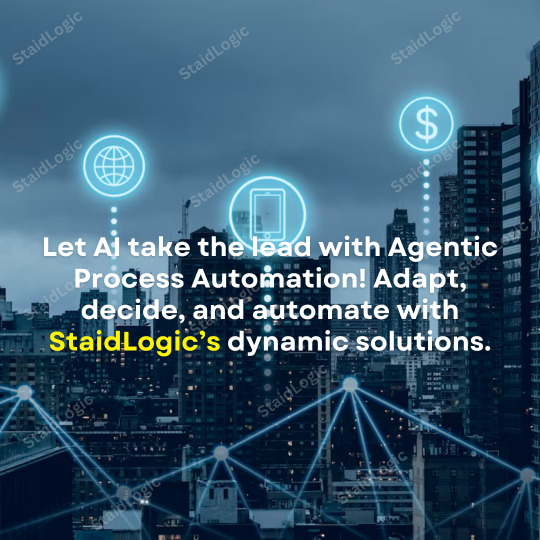
In today’s fast-paced world, businesses need smarter ways to improve efficiency and get things done faster. That’s where Agentic Process Automation (APA) comes in. It uses AI-powered agents that can make decisions, learn, and work together to handle tasks — just like a team of human experts
0 notes
Text
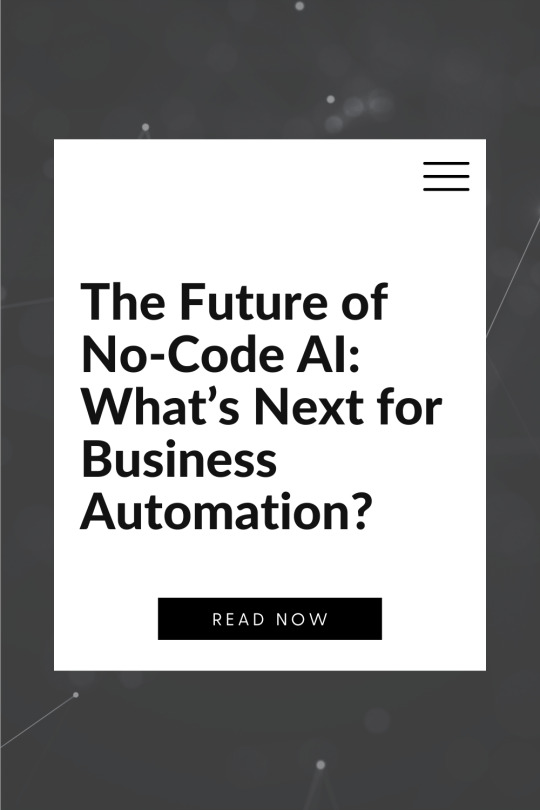
The Future of No-Code AI: What’s Next for Business Automation?
In a world where every second counts and competition grows fiercer by the day, the demand for speed, efficiency, and agility in business operations has never been higher. Yet, for many organizations, one major hurdle still stands in the way of true digital transformation: the bottleneck between ideas and implementation. Traditionally, building AI-driven solutions required specialized knowledge in programming, data science, and machine learning. However, the rise of no-code platforms is radically changing that narrative.
No longer confined to the IT department or data science labs, artificial intelligence is becoming accessible to anyone with a business problem to solve. Thanks to no-code AutoML for data analysis and AI-driven data workflow automation, employees across departments, marketing teams, operations managers, HR specialists, and more can now build and deploy intelligent systems without writing a single line of code.
This shift is more than just a passing trend; it signals the beginning of a new era where AI is democratized and woven into the fabric of everyday business processes. But where is this movement heading, and what does the future hold for no-code AI and business automation?

What is No-Code AI?
At its core, no-code AI is the integration of artificial intelligence into user-friendly platforms that allow individuals to design, test, and deploy AI solutions through intuitive interfaces rather than programming languages. Whether it's drag-and-drop builders, visual logic trees, or templated workflows, these tools enable users to interact with complex machine learning models and automation engines with ease.
No-code AutoML (automated machine learning) for data analysis is a prime example. It enables users to upload datasets, select target variables, and automatically train predictive models that deliver insights, all without any manual coding or algorithm tuning. These tools handle everything from feature selection to model evaluation, simplifying what was once a complex, highly technical process.
Pair that with AI-driven data workflow automation where AI triggers, manages, and optimizes business processes and you get a powerful combination that transforms how organizations operate.
Why No-Code AI Matters Now
The rise of no-code AI is fuelled by several converging trends:
Data Explosion: Businesses generate and collect more data than ever before. Making sense of it quickly is no longer optional; it’s a competitive necessity.
Talent Shortage: Skilled data scientists and machine learning engineers are in high demand and short supply. No-code solutions bridge this gap by enabling non-technical users to solve problems independently.
Pressure to Innovate: Companies are under increasing pressure to innovate, streamline operations, and personalize experiences. No-code AI accelerates the path from concept to execution.
Remote and Agile Work: The shift to hybrid and remote work environments has emphasized the need for agile, cloud-based tools that can be used by distributed teams without relying on centralized IT support.
Together, these factors make a compelling case for why the future of business automation is intrinsically tied to no-code AI.
Key Applications of No-Code AI Today
No-code AI is already reshaping industries in practical, impactful ways:
1. Customer Experience Optimization
Marketers use AI-powered platforms to personalize email campaigns, segment audiences, and predict customer churn—without waiting on data teams. By leveraging no-code AutoML for data analysis, marketing professionals can quickly identify which messages resonate, which channels perform best, and when customers are most likely to engage.
The Future of AI in Customer Experience Optimization
AI-powered virtual assistants will engage customers with real-time, emotion-aware conversations.
Hyper-personalized content generation will dynamically tailor marketing strategies based on behavioural data.
Predictive AI will anticipate customer needs, adjusting campaigns without manual intervention.
2. Sales Forecasting and Lead Scoring
Sales managers build predictive models to forecast revenue or score incoming leads based on historical conversion data. These insights drive better pipeline management and help focus resources on high-impact opportunities.
The Future of AI in Sales Forecasting and Lead Scoring
AI-driven CRM tools will automatically adjust strategies based on customer behaviour.
Predictive coaching will refine outreach efforts, analyzing real-time sales signals.
Automated contract negotiation tools will optimize pricing and deal structures dynamically.
3. Supply Chain and Inventory Management
Retailers and logistics firms use AI-driven data workflow automation to optimize inventory levels, anticipate demand shifts, and reduce stockouts or overages. These workflows often run continuously in the background, automatically adjusting based on real-time data.
The Future of AI in Supply Chain and Inventory Management
AI-powered digital twins will simulate and optimize logistics.
Autonomous inventory management will adjust stock levels proactively to reduce waste.
Robotics and AI-driven warehouses will handle fulfillment operations with minimal human involvement.
4. Human Resources and Talent Analytics
Recruiters and HR managers use no-code AI to analyze resumes, predict employee turnover, and understand engagement patterns across the workforce. This leads to better hiring decisions, higher retention, and a more responsive HR function.
The Future of AI in Human Resources and Talent Analytics
AI will personalize career path recommendations based on an employee’s skills and goals.
AI-driven workplace monitoring will predict engagement levels and well-being trends.
Virtual AI interview assistants will analyze soft skills and leadership potential in candidates.
5. Financial and Risk Analysis
Finance departments leverage no-code tools to automate fraud detection, monitor compliance, and perform scenario analysis without relying on complex spreadsheets or external consultants.
The Future of AI in Financial and Risk Analysis
AI-powered fraud prevention will analyze transactions in real time, stopping fraud instantly.
Automated regulatory compliance tools will ensure financial operations meet legal requirements.
Predictive financial planning will optimize investments and forecast economic shifts with high accuracy.
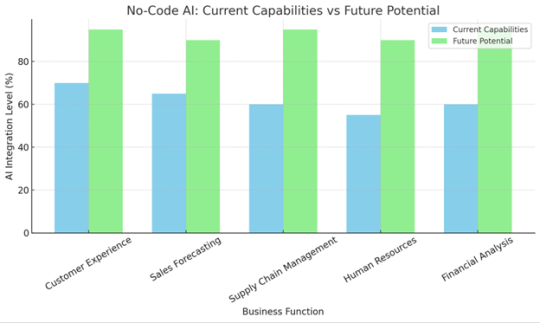
The future of no-code AI is incredibly promising, with rapid growth expected across all areas and industries. As tools become more intuitive and powerful, organizations of every size are beginning to harness AI without the need for technical expertise. From marketing and operations to finance and HR, no-code AI is opening the door to smarter automation, faster insights, and more agile decision-making. This widespread adoption signals a major shift toward a future where intelligent technology becomes a core part of everyday business processes.
“Every company is now a software company. No-code AI just makes that statement even more true.”
— Satya Nadella (CEO of Microsoft)
Where No-Code AI is Headed
As powerful as today’s no-code AI platforms are, they are only the beginning. Looking ahead, several emerging developments are set to expand the capabilities and impact of these tools even further.
1. Integration with Business Intelligence (BI) Tools
The next wave of no-code AI platforms will integrate more seamlessly with popular BI tools like Tableau, Power BI, and Looker. Users will be able to build AI models directly within their dashboards, combining traditional analytics with predictive intelligence in one unified interface.
2. Natural Language Interfaces
We are moving toward a world where building AI models could be as simple as typing or speaking a request. "Show me the top factors influencing customer churn" or "Predict next quarter’s sales by region" are the kinds of prompts that will drive AI actions behind the scenes. Natural language processing will enable deeper interaction between humans and machines in a way that feels intuitive and conversational.
3. Automated Compliance and Ethics Features
As AI regulations and ethical concerns gain traction, future no-code platforms will include built-in features to flag bias, ensure fairness, and maintain compliance. These tools will provide transparency into how models make decisions and give users greater control over model governance.
4. Domain-Specific Solutions
We’ll see an explosion of industry-specific no-code AI platforms tailored to healthcare, legal services, education, and manufacturing. These vertical tools will come preloaded with templates, datasets, and model architectures optimized for each domain, reducing the time to value even further.
5. Hyperautomation through AI-Driven Workflow Orchestration
No-code AI will increasingly become the engine behind hyperautomation initiatives where entire end-to-end business processes are automated using AI, machine learning, robotic process automation (RPA), and digital decisioning. These systems will not only execute workflows but learn and optimize them continuously over time.
Overcoming the Challenges
Despite its many advantages, no-code AI is not without challenges. Organizations must navigate a few key obstacles to unlock its full potential:
Data Quality and Accessibility: AI is only as good as the data it is trained on. Ensuring clean, relevant, and accessible data is essential for success.
User Education: While these tools require no coding, they still demand a certain level of data literacy. Businesses must invest in training and support to empower users to use no-code AI responsibly and effectively.
Model Governance: As more non-technical users build and deploy AI models, organizations need clear guidelines for version control, model approval, and performance monitoring.
Security and Privacy: With increased access to data and automation capabilities, maintaining strong security practices and compliance with data protection regulations becomes even more important.
Why Businesses Can’t Afford to Wait
The writing is on the wall: no-code AI is not a gimmick or a temporary shortcut; it is a fundamental shift in how organizations build intelligence into their operations. Early adopters are already reaping the benefits: faster decision-making, lower costs, higher efficiency, and increased innovation.
Organizations that embrace AI-driven data workflow automation and empower their teams with no-code AutoML for data analysis will spend less time battling internal bottlenecks and more time delivering value to customers.
More importantly, they will foster a culture of advancement, where ideas can be tested quickly, feedback loops are accelerated, and anyone with curiosity and drive can become a problem-solver.
A Smarter, Faster Future is Within Reach
The future of no-code AI is bright, dynamic, and packed with opportunity. As tools become more powerful and user-friendly, we will witness a world where building AI is no longer the privilege of the few, but the everyday skill of the many.
AI-driven data workflow automation will become a staple in business strategy, helping organizations respond to change with agility and confidence. No-code AutoML for data analysis will be the default approach for teams seeking fast, actionable insights.
As the lines between tech-savvy and business-savvy continue to blur, the next generation of leaders will not only understand data, they’ll be able to harness it, shape it, and turn it into real-world impact.
Learn more about DataPeak:
#factr#agentic ai#machine learning#artificial intelligence#technology#datapeak#saas#ai#ai-driven business solutions#machine learning for workflow#automation#artificialintelligence#ai solutions for data driven decision making#ai business tools#aiinnovation#datadrivendecisions#data driven decision making#data analytics#futuretech#ai platform for business process automation#ai driven business solutions#ai business solutions#dataanalytics#digital technology#digitaltools#digital trends
0 notes
Text
Discover how IoT, AI, and Blockchain can cut costs, boost efficiency, and future-proof your supply chain. Learn how SMBs can leverage these innovations for success in 2025.
#AI agent process automation for manufacturing#ai agents for manufacturing#ai agents in manufacturing#industrial ai agents#ai agents in production
0 notes
Text

Learn how autonomous AI agents revolutionize business process automation. Enhance productivity and streamline workflows with advanced AI technology.
#autonomous ai agents#ai agents#advanced ai technology#intelligent automation#rpa#business process automation
0 notes
Text
Inside the AI Based Contact Center with Tools Tech and Trends
Introduction

The evolution of customer service has entered a new era with the rise of the AI based contact center. No longer just a support line, today’s contact centers are intelligent, data-driven hubs that utilize artificial intelligence to deliver personalized, efficient, and scalable customer interactions. As businesses race to stay ahead of the curve, understanding the essential tools, technologies, and emerging trends that power AI-driven contact centers becomes crucial. This article explores how AI is transforming contact centers and what lies ahead for this innovative landscape.
The Rise of the AI Based Contact Center
Traditional contact centers, though essential, have long suffered from inefficiencies such as long wait times, inconsistent service, and high operational costs. AI-based contact centers are solving these issues by automating routine tasks, predicting customer needs, and delivering omnichannel support.
AI technology, such as machine learning, natural language processing (NLP), and robotic process automation (RPA), is now integrated into contact center platforms to enhance agent productivity and customer satisfaction.
Essential Tools Driving AI Based Contact Centers
1. AI-Powered Chatbots and Virtual Agents
Chatbots are the most visible AI tool in contact centers. These virtual assistants handle customer queries instantly and are available 24/7. Advanced bots can handle complex conversations using NLP and deep learning, reducing human intervention for repetitive inquiries.
2. Intelligent Interactive Voice Response (IVR) Systems
Modern IVR systems use voice recognition and AI to route calls more accurately. Unlike traditional menu-based IVRs, intelligent IVRs can interpret natural language, making customer interactions smoother and faster.
3. Speech Analytics Tools
AI-driven speech analytics tools analyze live or recorded conversations in real time. They extract keywords, sentiments, and emotional cues, offering insights into customer satisfaction, agent performance, and compliance issues.
4. Workforce Optimization (WFO) Platforms
AI helps optimize staffing through forecasting and scheduling tools that predict call volumes and agent availability. These platforms improve efficiency and reduce costs by aligning workforce resources with demand.
5. CRM Integration and Predictive Analytics
By integrating AI with CRM systems, contact centers gain predictive capabilities. AI analyzes customer data to forecast needs, recommend next-best actions, and personalize interactions, leading to higher engagement and retention.
Core Technologies Enabling AI Based Contact Centers
1. Natural Language Processing (NLP)
NLP allows machines to understand, interpret, and respond in human language. This is the backbone of AI-based communication, enabling features like voice recognition, sentiment detection, and conversational AI.
2. Machine Learning and Deep Learning
These technologies enable AI systems to learn from past interactions and improve over time. They are used to personalize customer interactions, detect fraud, and optimize call routing.
3. Cloud Computing
Cloud platforms provide the infrastructure for scalability and flexibility. AI contact centers hosted in the cloud offer remote access, fast deployment, and seamless integration with third-party applications.
4. Robotic Process Automation (RPA)
RPA automates repetitive tasks such as data entry, ticket generation, and follow-ups. This frees up human agents to focus on more complex customer issues, improving efficiency.
Emerging Trends in AI Based Contact Centers
1. Hyper-Personalization
AI is pushing personalization to new heights by leveraging real-time data, purchase history, and browsing behavior. Contact centers can now offer customized solutions and product recommendations during live interactions.
2. Omnichannel AI Integration
Customers expect consistent service across channels—phone, email, chat, social media, and more. AI tools unify customer data across platforms, enabling seamless, context-aware conversations.
3. Emotion AI and Sentiment Analysis
Emotion AI goes beyond words to analyze voice tone, pace, and volume to determine a caller's emotional state. This data helps agents adapt their responses or triggers escalations when needed.
4. Agent Assist Tools
AI now works hand-in-hand with human agents by suggesting responses, summarizing calls, and providing real-time knowledge base access. These agent assist tools enhance productivity and reduce training time.
5. AI Ethics and Transparency
As AI becomes more prevalent, companies are increasingly focused on responsible AI usage. Transparency in how decisions are made, data privacy, and eliminating bias are emerging priorities for AI implementation.
Benefits of Adopting an AI Based Contact Center
Businesses that adopt AI-based contact centers experience a variety of benefits:
Improved Customer Satisfaction: Faster, more accurate responses enhance the overall experience.
Cost Reduction: Automation reduces reliance on large human teams for repetitive tasks.
Increased Scalability: AI can handle spikes in volume without compromising service quality.
Better Insights: Data analytics uncover trends and customer behaviors for better strategy.
Challenges in AI Based Contact Center Implementation
Despite the advantages, there are challenges to be aware of:
High Initial Investment: Setting up AI tools can be capital intensive.
Integration Complexities: Integrating AI with legacy systems may require customization.
Change Management: Staff may resist AI adoption due to fear of replacement or complexity.
Data Security and Compliance: AI systems must adhere to data protection regulations like GDPR or HIPAA.
Future Outlook of AI Based Contact Centers
The future of AI-based contact centers is promising. As technology matures, we can expect deeper personalization, more intuitive bots, and stronger collaboration between human agents and AI. Voice AI will become more empathetic and context-aware, while backend analytics will drive strategic decision-making.
By 2030, many experts predict that AI will handle the majority of customer interactions, with human agents stepping in only for high-level concerns. This hybrid model will redefine efficiency and service quality in the contact center industry.
Conclusion
The AI based contact center is transforming how businesses interact with customers. With powerful tools, cutting-edge technologies, and evolving trends, organizations are reimagining the contact center as a strategic asset rather than a cost center. By investing in AI, companies can enhance customer experiences, improve operational efficiency, and stay competitive in an increasingly digital marketplace. The time to explore and adopt AI contact center solutions is now—because the future of customer support is already here.
#AI based contact center#contact center tools#AI contact center technology#artificial intelligence in customer service#customer service automation#chatbot integration#virtual agents#intelligent IVR systems#speech analytics#workforce optimization#predictive analytics in contact centers#CRM integration with AI#natural language processing#machine learning in call centers#robotic process automation#omnichannel support#emotion AI#agent assist tools#contact center trends#AI-powered customer experience
0 notes
Text
A young entrepreneur who was among the earliest known recruiters for Elon Musk’s so-called Department of Government Efficiency (DOGE) has a new, related gig—and he’s hiring. Anthony Jancso, cofounder of AccelerateX, a government tech startup, is looking for technologists to work on a project that aims to have artificial intelligence perform tasks that are currently the responsibility of tens of thousands of federal workers.
Jancso, a former Palantir employee, wrote in a Slack with about 2000 Palantir alumni in it that he’s hiring for a “DOGE orthogonal project to design benchmarks and deploy AI agents across live workflows in federal agencies,” according to an April 21 post reviewed by WIRED. Agents are programs that can perform work autonomously.
“We’ve identified over 300 roles with almost full-process standardization, freeing up at least 70k FTEs for higher-impact work over the next year,” he continued, essentially claiming that tens of thousands of federal employees could see many aspects of their job automated and replaced by these AI agents. Workers for the project, he wrote, would be based on site in Washington, DC, and would not require a security clearance; it isn’t clear for whom they would work. Palantir did not respond to requests for comment.
The post was not well received. Eight people reacted with clown face emojis, three reacted with a custom emoji of a man licking a boot, two reacted with custom emoji of Joaquin Phoenix giving a thumbs down in the movie Gladiator, and three reacted with a custom emoji with the word “Fascist.” Three responded with a heart emoji.
“DOGE does not seem interested in finding ‘higher impact work’ for federal employees,” one person said in a comment that received 11 heart reactions. “You’re complicit in firing 70k federal employees and replacing them with shitty autocorrect.”
“Tbf we’re all going to be replaced with shitty autocorrect (written by chatgpt),” another person commented, which received one “+1” reaction.
“How ‘DOGE orthogonal’ is it? Like, does it still require Kremlin oversight?” another person said in a comment that received five reactions with a fire emoji. “Or do they just use your credentials to log in later?”
Got a Tip?Are you a current or former government employee who wants to talk about what's happening? We'd like to hear from you. Using a nonwork phone or computer, contact the reporter securely on Signal at carolinehaskins.61 and vittoria89.82.
AccelerateX was originally called AccelerateSF, which VentureBeat reported in 2023 had received support from OpenAI and Anthropic. In its earliest incarnation, AccelerateSF hosted a hackathon for AI developers aimed at using the technology to solve San Francisco’s social problems. According to a 2023 Mission Local story, for instance, Jancso proposed that using large language models to help businesses fill out permit forms to streamline the construction paperwork process might help drive down housing prices. (OpenAI did not respond to a request for comment. Anthropic spokesperson Danielle Ghiglieri tells WIRED that the company "never invested in AccelerateX/SF,” but did sponsor a hackathon AccelerateSF hosted in 2023 by providing free access to its API usage at a time when its Claude API “was still in beta.”)
In 2024, the mission pivoted, with the venture becoming known as AccelerateX. In a post on X announcing the change, the company posted, “Outdated tech is dragging down the US Government. Legacy vendors sell broken systems at increasingly steep prices. This hurts every American citizen.” AccelerateX did not respond to a request for comment.
According to sources with direct knowledge, Jancso disclosed that AccelerateX had signed a partnership agreement with Palantir in 2024. According to the LinkedIn of someone described as one of AccelerateX’s cofounders, Rachel Yee, the company looks to have received funding from OpenAI’s Converge 2 Accelerator. Another of AccelerateSF’s cofounders, Kay Sorin, now works for OpenAI, having joined the company several months after that hackathon. Sorin and Yee did not respond to requests for comment.
Jancso’s cofounder, Jordan Wick, a former Waymo engineer, has been an active member of DOGE, appearing at several agencies over the past few months, including the Consumer Financial Protection Bureau, National Labor Relations Board, the Department of Labor, and the Department of Education. In 2023, Jancso attended a hackathon hosted by ScaleAI; WIRED found that another DOGE member, Ethan Shaotran, also attended the same hackathon.
Since its creation in the first days of the second Trump administration, DOGE has pushed the use of AI across agencies, even as it has sought to cut tens of thousands of federal jobs. At the Department of Veterans Affairs, a DOGE associate suggested using AI to write code for the agency’s website; at the General Services Administration, DOGE has rolled out the GSAi chatbot; the group has sought to automate the process of firing government employees with a tool called AutoRIF; and a DOGE operative at the Department of Housing and Urban Development is using AI tools to examine and propose changes to regulations. But experts say that deploying AI agents to do the work of 70,000 people would be tricky if not impossible.
A federal employee with knowledge of government contracting, who spoke to WIRED on the condition of anonymity because they were not authorized to speak to the press, says, “A lot of agencies have procedures that can differ widely based on their own rules and regulations, and so deploying AI agents across agencies at scale would likely be very difficult.”
Oren Etzioni, cofounder of the AI startup Vercept, says that while AI agents can be good at doing some things—like using an internet browser to conduct research—their outputs can still vary widely and be highly unreliable. For instance, customer service AI agents have invented nonexistent policies when trying to address user concerns. Even research, he says, requires a human to actually make sure what the AI is spitting out is correct.
“We want our government to be something that we can rely on, as opposed to something that is on the absolute bleeding edge,” says Etzioni. “We don't need it to be bureaucratic and slow, but if corporations haven't adopted this yet, is the government really where we want to be experimenting with the cutting edge AI?”
Etzioni says that AI agents are also not great 1-1 fits for job replacements. Rather, AI is able to do certain tasks or make others more efficient, but the idea that the technology could do the jobs of 70,000 employees would not be possible. ���Unless you're using funny math,” he says, “no way.”
Jancso, first identified by WIRED in February, was one of the earliest recruiters for DOGE in the months before Donald Trump was inaugurated. In December, Jancso, who sources told WIRED said he had been recruited by Steve Davis, president of the Musk-founded Boring Company and a current member of DOGE, used the Palantir alumni group to recruit DOGE members. On December 2nd, 2024, he wrote, “I’m helping Elon’s team find tech talent for the Department of Government Efficiency (DOGE) in the new admin. This is a historic opportunity to build an efficient government, and to cut the federal budget by 1/3. If you’re interested in playing a role in this mission, please reach out in the next few days.”
According to one source at SpaceX, who asked to remain anonymous as they are not authorized to speak to the press, Jancso appeared to be one of the DOGE members who worked out of the company’s DC office in the days before inauguration along with several other people who would constitute some of DOGE’s earliest members. SpaceX did not respond to a request for comment.
Palantir was cofounded by Peter Thiel, a billionaire and longtime Trump supporter with close ties to Musk. Palantir, which provides data analytics tools to several government agencies including the Department of Defense and the Department of Homeland Security, has received billions of dollars in government contracts. During the second Trump administration, the company has been involved in helping to build a “mega API” to connect data from the Internal Revenue Service to other government agencies, and is working with Immigration and Customs Enforcement to create a massive surveillance platform to identify immigrants to target for deportation.
10 notes
·
View notes